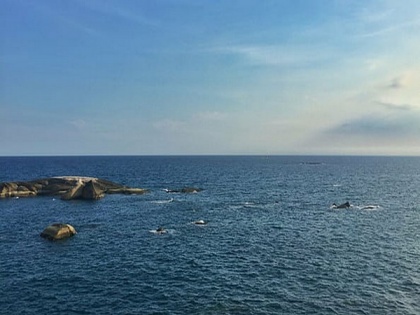China-backed Thai canal potential next front in India-China conflict
By ANI | Published: September 2, 2020 11:56 AM2020-09-02T11:56:58+5:302020-09-02T12:31:47+5:30
The long-awaited canal in southern Thailand's Kra Isthmus is the latest in China's attempt to encircle India with a series of alliances and naval bases even as tensions continue between New Delhi and Beijing over the standoff in Ladakh, according to a report.

China-backed Thai canal potential next front in India-China conflict
The long-awaited canal in southern Thailand's Kra Isthmus is the latest in China's attempt to encircle India with a series of alliances and naval bases even as tensions continue between New Delhi and Beijing over the standoff in Ladakh, according to a report.
The Thai canal could be a crucial strategic asset for China, allowing its navy to quickly move ships between its newly constructed bases in the South China Sea and the Indian Ocean without diverting over 1,100 kilometres south to round the tip of Malaysia, Foreign Policy reported.
The Chinese Navy is moving further west into the Bay of Bengal and the Indian Ocean, building an East African logistics base in Djibouti and conducting joint exercises in the region with Myanmar, Bangladesh, Iran, Pakistan and Russia.
"The plethora of China-sponsored port infrastructure projects throughout the region only add to the impression of encirclement. India has responded by gearing up for potential future confrontations with China at sea," the article said.
Long controversial, the canal, has now seemed to garner widespread support among Thailand's political elite, with a parliamentary committee scheduled to deliver its recommendations on the project this month. This is significant even as Thailand has strongly tilted towards China after the United States refused to acknowledge the government, which was established by the military junta in 2014.
The Malacca Strait, which is one of the key shipping lanes in the region, has seen more than 80,000 ships passing through the narrow sea lane.
Thai Canal Association, which is closely linked to the politically powerful Thai Army, says that building industrial parks and logistics hubs at both ends could become one of Asia's major transit arteries, according to Foreign Policy.
While the canal would be uneconomical at today's shipping rates and fuel costs, according to industry experts, the Strait of Malacca has nearly reached its safe limit in terms of shipping volume it can handle.
The current Thai canal proposal -- the 9A route -- would have two parallel channels each having 30 metres deep, 180 metres wide and running 75 miles at sea level from Songkhla on the Gulf of Thailand to Krabi in the Andaman Sea, the report said.
As Thailand's territorial integrity is relatively secure today, a successful Thai canal project would see a change in Southeast Asia's political geography -- a situation where China would be a permanent security partner and cannot be easily kicked out.
"Coupled with planned investments in ports at Sihanoukville in Cambodia and Kyaukpyu in Myanmar, China will see the Thai canal as a strategic waterway connecting its string of pearls. Were a hostile government in Bangkok ever to threaten to cut that string, it is not inconceivable that China would support an independence movement in the south and seize control of the canal in an intervention justified by the need to protect its own interests--again," the article said.
Thailand, however, risks being divided in two while embracing the proposed canal project. The country faces an active insurgency in its three southernmost provinces, which has a majority of Malay Muslims. The article highlights that the canal could become a symbolic border between "mainland" Thailand in the north and a separatist movement in the south.
While the Thai military's aggressive counter-insurgency campaign will not be hampered, it would create a divide, which could go on for centuries.
"Once the channels have been dug out, they would be impossible to fill in, and if Thailand were ever to break in two, the Thai canal could be the fault along which it cracks," said the article.
A Thai canal would pose a little threat to the US and its allies, including India, which can effectively counter Chinese expansionism with the upgradation of domestic forward bases in the Andaman and Nicobar Islands, Foreign Policy reported.
"The real concern is that it would further undermine the independence of poor southeast Asian countries like Myanmar and Cambodia, which have comparatively weak civil societies that are highly vulnerable to Chinese interference. And it absolutely imperils Thailand," the article said.
( With inputs from ANI )
Disclaimer: This post has been auto-published from an agency feed without any modifications to the text and has not been reviewed by an editor
Open in app